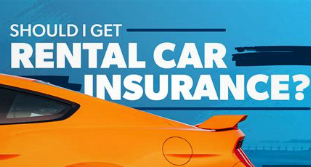When traveling to a new destination, whether for business or pleasure, renting a car is one of life’s great conveniences. Closer to home, it also provides piece of mind if your own vehicle is temporarily out of commission due to service or as a result of a collision.
The most commonly asked question when renting a vehicle is do you need to purchase the rental company’s insurance coverage?
“When you rent a car, the rental agency has only a nominal amount of protection for liability claims,” said Kevin Quinn Vice President of Auto Claims at Mercury Insurance. “That means if you get into an accident, you may be responsible for significant charges.”
Here are a few things to consider before purchasing rental insurance:
1. Loss Damage Waivers
Many insurance companies do not provide a Loss Damage Waiver (LDW), so you may want to consider purchasing this additional coverage. These waivers are a “get-out-of-jail free” card absolving drivers of liability for theft of – or damage to – the vehicle. The extra charge is added to the daily rental price, and the standard fee typically ranges between 25 and 40 percent.
2. Stand-Alone Rental Car Coverage
Did you reserve and pay for your rental car with a credit card? If so, you may be able to reap some rewards. According to NerdWallet, all four major credit card companies – Visa, Mastercard, American Express and Discover – offer rental insurance benefits. These policies vary by company, so be sure to look into coverage details and limitations, because many of them provide secondary coverage. This means that if you need to make a claim, you will have to go through your insurance company first. The credit card would then cover costs your insurance company doesn’t…up to the limits stated in your credit card agreement. Some cards, like the Chase United Mileage Plus Explorer cards provide primary coverage, which means you don’t need to go through your insurance company.
3. Collision and Comprehensive Coverage
Typically, your personal auto insurance collision and comprehensive coverage extends to rental vehicles if you purchased that coverage as part of your personal auto insurance package. Collision insurance pays for damage to the rental car, regardless of fault. Comprehensive insurance protects against non-collision damage like theft, vandalism, fires, floods and hailstorms. If you’re involved in any of these scenarios, you’ll most likely have to pay the deductible – $250, $500 and $1,000 deductibles are common – before your insurance company will pay out any money. Speak with your insurance agent and check your policy for specifics.
4. Liability Coverage
Liability coverage from your auto insurance policy usually extends to rental vehicles. Supplemental liability insurance is available at the counter with a limit of $1 million, but drivers should look into the liability coverage provided by their personal auto insurance before purchasing additional insurance.
If you don’t want to rely on your own insurance policy and didn’t book the vehicle through a major credit card with rental car coverage benefits, purchasing insurance through the rental company is a good idea. Covered drivers can opt out of purchasing added coverage from the rental company. However, an important thing to consider is the claims process. Accidents may still impact your primary auto insurance premium and if you’re taking advantage of credit card rental insurance benefits, you’ll have to consider the company’s claims process as well. Contact your insurance agent and credit card lender to be confident in your decision when you leave the counter with your keys.
This article was originally published here by our partner Mercury Insurance.
To learn more about auto insurance contact Tague Insurance Agency.
Tague Insurance Agency is an independently owned and locally operated insurance agency in Vista, California. We help people across the state find affordable and reliable insurance products from a variety of trusted carriers. As an independent agency, we can help you find the perfect combination of coverage and price to fit your unique needs.
What Does Independent Mean?
“Independent” means we’re not tied to any one insurance carrier. In other words, we can research rates and coverage options from several top insurance companies to find the best policies for you. We do the shopping and comparing to save you time and money!
How to Get in Touch
We invite you to submit a free online quote request or call us at 760-509-4667 to review coverage options for auto, home, life, health, business, and more. We provide free, no hassle and no obligation insurance quotes to help you make an informed decision.


















